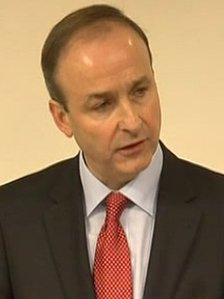Fianna Fail accuses Irish government of neglecting Northern Ireland
- Published

Micheal Martin accused the Irish government of complacency
The Irish government has been accused of neglect and complacency over the Northern Ireland peace process.
The comments were made by Micheal Martin, who leads the Irish Republic's main opposition party, Fianna Fail.
Mr Martin warned taking past political achievements for granted "could be a mistake of historic proportions".
He accused the government of backing away from cross border institutions and holding the "bare minimum of meetings" on issues concerning Northern Ireland.
The Fianna Fail leader made the remarks on Sunday at an annual event to commemorate the Irish revolutionary leader, Wolfe Tone.
'Unacceptable'
In his speech at Bodenstown Cemetery in County Kildare, Mr Martin said the Irish government had "dramatically reduced its level of engagement with Northern affairs".
"Given the effort that went into this process over a very long time by very many people, this sort of disengagement and complacency by our own government is unacceptable."
Fianna Fail was in power in the Republic continuously from 1997 to 2011, and was heavily involved in the Good Friday Agreement negotiations which helped to set up Northern Ireland's devolved administration at Stormont.
Mr Martin told supporters at the cemetery: "Unfortunately too many people today think that the work is over - that we can take for granted what has been achieved. This could be a mistake of historic proportions."
After a poor performance in the Irish General Election last February, the party was replaced by the current coalition government of Fine Gael and Labour.
Mr Martin said that the Republic's new Prime Minister, Enda Kenny, had made "no attempt" to move the Northern Ireland peace process on to the next stage.
'Reckless'
Comparing the coalition's performance to Fianna Fail's time in power, he said: "We knew that you couldn't just let the protagonists get on with it, the Irish government had a duty to lead".
Mr Martin also questioned whether the Good Friday Agreement was delivering in real terms for people living in Northern Ireland and highlighted the issue of child poverty as an area where things were getting worse instead of better.
He singled out the two biggest parties in the Stormont Executive for criticism.
"It is as best foolish and at worst reckless to step back and believe that the DUP and Sinn Fein are capable of working in the interests of all groups.
"They have constantly shown an interest in putting party interests ahead of broader interests," he said.
He accused Sinn Fein of "playing politics" with the UK Welfare Reform Bill, which came before the Stomont Assembly 11 days ago.
Parades
He claimed they had "pretended to campaign against it and voted against it when it was clear that an Assembly majority was going to push it through in any case".
He told supporters that only five pieces of legislation had passed through the Assembly over the past year, at a time when the news in Northern Ireland had been "dominated by old parades politics".
However, Sinn Fein President Gerry Adams said Mr Martin's criticism of the Fine Gael/Labour government rings hollow.
He said the current government in the Republic of Ireland was simply implementing the policies of the last Fianna Fail government.
"His attack on Sinn Fein is equally bogus," he said.
"The end of conflict, the peace process and the power sharing institutions are among the greatest achievements of modern years.
"Sinn Fein on the Executive is attempting, in the absence of fiscal powers, to manage a serious economic crisis and is succeeding much more effectively than Fianna Fail in government or in opposition has.
"Micheal Martin's comments have more to do with his fear of Sinn Fein in the south than a concern about the north."
Mr Martin was elected leader of Fianna Fail in January 2011.
During the party's time in power, he served as minister in several government departments including foreign affairs, health, enterprise and education.
- Published17 October 2012
- Published14 September 2012
- Published19 April 2012